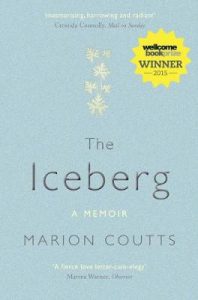 Marion Coutts’s memoir covers the final two and a half years between her husband Tom Lubbock’s diagnosis with a brain tumour, and his death in a hospice. During that time Tom progressively, sometimes temporarily, lost aspects of language, while their son Eugene, 18 months when Tom was diagnosed, was experimenting and expanding his language skills.
Marion Coutts’s memoir covers the final two and a half years between her husband Tom Lubbock’s diagnosis with a brain tumour, and his death in a hospice. During that time Tom progressively, sometimes temporarily, lost aspects of language, while their son Eugene, 18 months when Tom was diagnosed, was experimenting and expanding his language skills.
Coutts’s book should be read in tandem with Lubbock’s own account, Until Further Notice, I Am Alive (published posthumously in 2012). Their varying perspectives clarify times when they have different roles, for example when he is in hospital for his brain operations to debulk the tumour. On these occasions Marion is frantically racing around doing the childcare, communicating with friends, and maintaining the household, whilst also trying to keep tabs on what is happening to Tom. (Her work as an artist falls away at these moments of crisis.) Faulty messages from the hospital about when Tom emerges from surgery (giving the impression that his operation has lasted hours more than expected) result in unnecessary worry.
The other period of time illuminated by Marion’s narrative is when Tom Lubbock’s own narrative breaks down. The later passages of Until Further Notice are sparse, with short paragraphs, shorter sentences, and at times lack of verbs. There are no entries after October 2010. But Tom lives until January 2011, entering a local hospice where they entertain friends for Christmas, his birthday, and New Year. Coutts describes that Christmas with short sentences. Facts that have fathoms of meaning. She describes the presents: a blanket she makes for Tom with significant shapes stitched on it, and a nest of tables for Tom to give to Eugene. It is unspeakably moving. Later Marion seems surprised by the gentle nature of Tom’s death, his increasing tendency to sleep. She describes the ambivalent emotions within her: watching him intently, and yet an inability to concentrate fully as she wishes; a wish for him to stay, and at the same time a wish for him to leave.
Eugene, their son, is a growing child during this period. Marion describes his reactions to his father’s language difficulties and then his further decline. Eugene interacts with family friends and relations, and his own contemporaries, making his own life, even as his father’s is ending. She describes how their son enters the room at the hospice, patting his father and laying his head on Tom’s arm, before departing to the care of friends. It is poignant and emotional and difficult. But it feels right, an acknowledgement of how things are, which will enable Eugene to survive his father’s death.
This is a beautiful and moving memoir, about how to live and die, and how to live in the face of dying. There are important things here about the role of hospice care. Tom Lubbock’s ways of circumventing his language and communication difficulties are described and analysed from the outside (just as he analyses them from inside in Until Further Notice). There are important observations about many aspects of earlier care – the advantages and disadvantages of appearing strong as a family unit or as a carer, the giveaway body-language of health professionals – all carefully depicted as only an artist can.
A worthy winner of the Wellcome book prize, and very highly recommended, especially for those in cancer care, palliative care, and those with an interest in aphasia.
Coutts, Marion (2014) The Iceberg, London, Atlantic Books.